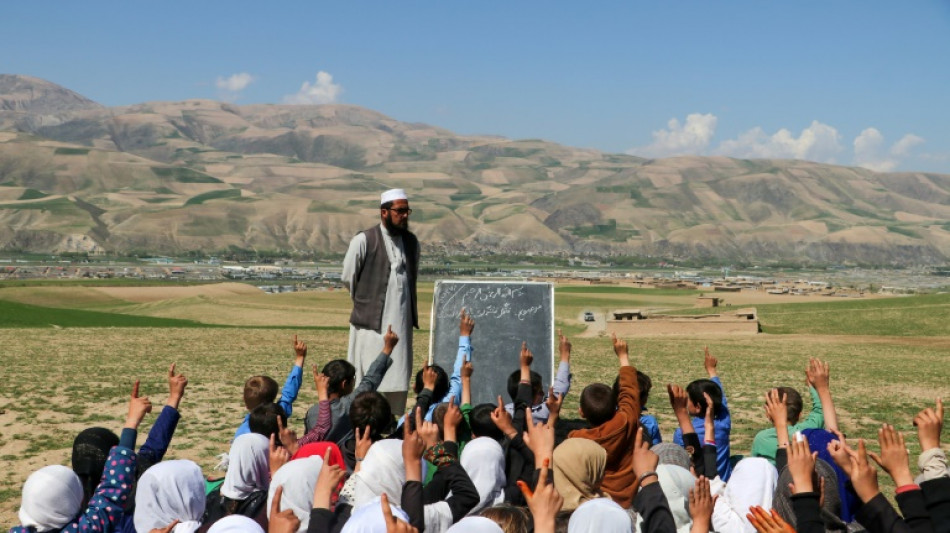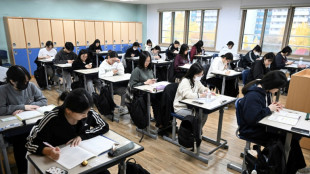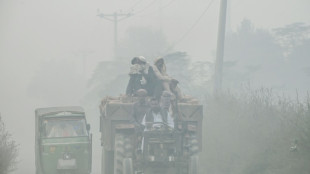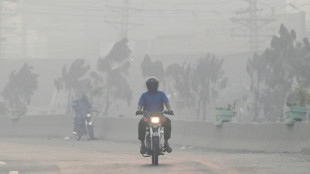
-
 UN climate chief urges G20 to spur tense COP29 negotiations
UN climate chief urges G20 to spur tense COP29 negotiations
-
Philippines warns of 'potentially catastrophic' Super Typhoon Man-yi

-
 Tens of thousands flee as Super Typhoon Man-yi nears Philippines
Tens of thousands flee as Super Typhoon Man-yi nears Philippines
-
Gabon votes on new constitution hailed by junta as 'turning point'

-
 Tens of thousands flee as Typhoon Man-yi nears Philippines
Tens of thousands flee as Typhoon Man-yi nears Philippines
-
Is Argentina's Milei on brink of leaving Paris climate accord?

-
 Fitch upgrades Argentina debt rating amid economic pain
Fitch upgrades Argentina debt rating amid economic pain
-
Trump picks Doug Burgum as energy czar in new administration

-
 At summit under Trump shadow, Xi and Biden signal turbulence ahead
At summit under Trump shadow, Xi and Biden signal turbulence ahead
-
Xi warns against 'protectionism' at APEC summit under Trump cloud

-
 Xi, Biden at Asia-Pacific summit under Trump trade war cloud
Xi, Biden at Asia-Pacific summit under Trump trade war cloud
-
Leftist voices seek to be heard at Rio's G20 summit

-
 Boeing strike will hurt Ethiopian Airlines growth: CEO
Boeing strike will hurt Ethiopian Airlines growth: CEO
-
US retail sales lose steam in October after hurricanes

-
 Spate of child poisoning deaths sparks S.Africa xenophobia
Spate of child poisoning deaths sparks S.Africa xenophobia
-
Comedian Conan O'Brien to host Oscars

-
 Gore says 'absurd' to hold UN climate talks in petrostates
Gore says 'absurd' to hold UN climate talks in petrostates
-
Global stocks struggle after Fed signals slower rate cuts

-
 China tests building Moon base with lunar soil bricks
China tests building Moon base with lunar soil bricks
-
Oil execs work COP29 as NGOs slam lobbyist presence

-
 Gore says climate progress 'won't slow much' because of Trump
Gore says climate progress 'won't slow much' because of Trump
-
'Megaquake' warning hits Japan's growth

-
 Stiff business: Berlin startup will freeze your corpse for monthly fee
Stiff business: Berlin startup will freeze your corpse for monthly fee
-
Dominican Juan Luis Guerra triumphs at 25th annual Latin Grammys

-
 Tropical Storm Sara pounds Honduras with heavy rain
Tropical Storm Sara pounds Honduras with heavy rain
-
TikTok makes AI driven ad tool available globally

-
 Japan growth slows as new PM readies stimulus
Japan growth slows as new PM readies stimulus
-
China retail sales pick up speed, beat forecasts in October

-
 Pakistan's policies hazy as it fights smog
Pakistan's policies hazy as it fights smog
-
Mexico City youth grapple with growing housing crisis

-
 Cracks deepen in Canada's pro-immigration 'consensus'
Cracks deepen in Canada's pro-immigration 'consensus'
-
Japan's Princess Mikasa, great aunt to emperor, dies aged 101

-
 Venezuela opposition activist dies in custody
Venezuela opposition activist dies in custody
-
Policymakers defend Fed independence amid concerns about Trump era

-
 Lebanon economic losses top $5 billion in year of clashes: World Bank
Lebanon economic losses top $5 billion in year of clashes: World Bank
-
Fed Chair calls US the best-performing major economy in the world

-
 Brother of late Harrods owner also accused of sexual violence: BBC
Brother of late Harrods owner also accused of sexual violence: BBC
-
New York to revive driver congestion charge plan, drawing Trump ire

-
 China's Xi arrives in Peru for APEC summit, Biden meeting
China's Xi arrives in Peru for APEC summit, Biden meeting
-
Spain's Vanguardia daily to stop posting on 'disinformation network' X

-
 New York to revive driver congestion charge plan
New York to revive driver congestion charge plan
-
US stocks wobble as traders weigh future Fed cuts

-
 BHP, Vale cleared by Brazil court over 2015 dam disaster
BHP, Vale cleared by Brazil court over 2015 dam disaster
-
Legal migration to OECD reaches new record in 2023

-
 Central bank independence 'fundamental' for good policy: Fed official
Central bank independence 'fundamental' for good policy: Fed official
-
EU fines Meta $840 million for 'abusive' Facebook ad practices

-
 Iran tells UN nuclear chief willing to resolve 'ambiguities'
Iran tells UN nuclear chief willing to resolve 'ambiguities'
-
Coach owner Tapestry calls off Capri bid on regulatory blocks

-
 EU fines Meta 798 mn euros for Facebook ad antitrust breach
EU fines Meta 798 mn euros for Facebook ad antitrust breach
-
'Terrible' AI has given tech an existential headache: activist


Afghan girls and women cling to glitchy, lonesome online learning
Sequestered at home in a remote Afghan town, 18-year-old Shekiba often roams the house hunting for the patchy internet signal that is her last link to an education.
Shekiba has turned to online learning since the Taliban returned to power in 2021 and shut her out of classrooms, signing up for live economics lectures she squints at on a pocket-sized phone screen.
She hopes to save for a laptop but is forced to buy expensive mobile data packages that still don't guarantee a signal in the town of Ishkashim perched high in mountainous Badakhshan province.
"If there were no internet issues, it would be much easier," she told AFP by phone. "But it's better to carry on, instead of sitting and doing nothing."
"I just hope to study, to succeed, to progress. If one person progresses in a family, the whole family progresses, as well as the whole society."
Boys and men returned to classes with the start of the Afghan new year, but girls and women will be left behind again by a Taliban government education blockade that is part of a raft of restrictions the United Nations has labelled "gender apartheid".
While online alternatives have sprung up, a dearth of computers and internet, as well as the isolation of learning via screen, makes them a poor substitute for in-person learning, students and teachers say.
Many of those alternatives also cannot provide diplomas, which offer a promise that qualifications will be acknowledged.
- 'No perspective of future' -
It's unclear exactly how many girls and women are involved in online learning, but two higher education platforms report Afghans registering or applying in the tens of thousands since the Taliban takeover.
Begum Academy, an online platform with some 8,500 free videos in Dari and Pashto covering the Afghan secondary school curriculum, launched in December 2023 and quickly had more than 3,000 users.
Director Hamida Aman said parents are grateful but it's hard for girls to stay driven.
"It's difficult to get motivated when everything is closed to you and there's no perspective of future," she told AFP from France, where she is based.
"These girls cannot have certificates, or they cannot have the ambition to go to the university or to have any job later."
Education for girls and women was a key aim of the US-backed government but gains were largely limited to cities, with only 23 percent of girls aged 13 to 18 in school nationwide, according to the International Crisis Group.
The think tank said that figure dropped to 13 percent after the Taliban government issued its edicts barring female education in 2022.
Zainab was soon to start high school when it came into effect and was twice rebuffed by an online school that was at capacity before she finally secured a place.
"Before taking online classes, we were idle at home. We were worried. We used to sleep most of the time, which made us depressed," said Zainab, who asked not to use her full name for fear of reprisal.
Online classes "keep us busy", she told AFP, but they "cannot replace schools".
Twenty-two-year-old Ruhila teaches English classes online while trying to continue her university education, also virtually, and says the teaching helps her spirits.
"The only thing that gives me energy in the current situation is teaching these girls," she said.
"But when you accept that it's going to be online forever then you lose enthusiasm and you don't put in the same effort," she said. "Mentally, online classes are very tough. They are stressful, and boring."
Taliban authorities have insisted since girls were barred from secondary school that they are working on establishing a system that aligns with their interpretation of Islamic law.
- Poor internet, few computers -
Widespread virtual schooling during the Covid-19 pandemic demonstrated it was "at best, a rather partial substitute for in-person instruction", a UNESCO report found.
Afghan students face the burden of trying to log on in a country where the internet is often down -- or painfully slow -- and where electricity outages are common.
Less than a quarter of the population uses the internet, according to online insights company DataReportal. With stark poverty rates in Afghanistan, computers are also a luxury many cannot afford.
Some 90 percent of Begum Academy students use their phones to learn, according to Aman.
But even more than those frustrations, 18-year-old Aisha misses the social aspect of school.
"Online classes cannot be as effective as physical classes where we meet our peers and our teachers and exchange our ideas," she said.
"Online courses can only give us a hope," she added. "But we can never say, 'I have studied online so I have graduated from school.'"
H.Meyer--CPN




